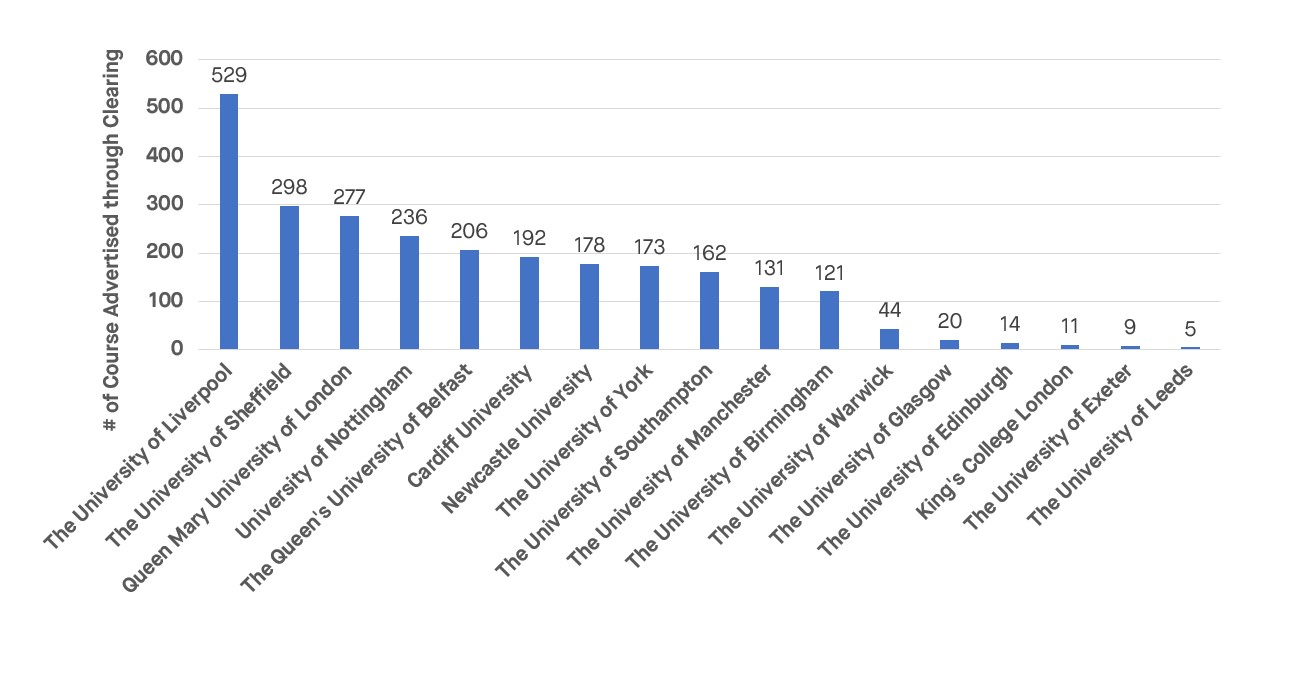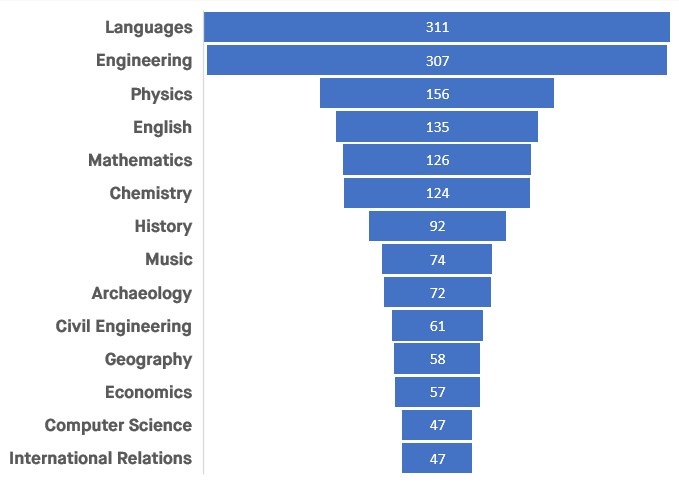
UCAS Clearance Courses Data Insights

Key findings:
- Almost 28,000 distinct courses are available through clearing, across 330 providers
- 17 Russell Group Universities have clearing spots available
- The University of Liverpool has the most available courses through clearing of all the Russell Group institutions
- Subjects related to foreign languages are the most commonly available course types in clearing
UCAS Clearing Opens
For students still seeking places at university for this coming academic year, the Universities and Colleges Admissions Service (UCAS) clearing process has now opened for 2022 and will run until October 18th.
Students can apply for university places through clearing providing they meet any of the following criteria;
- If they are applying after 30th June
- If no offers were received (or there were none received that the applicant wanted to accept)
- The conditions of the offers were not met by the student
- The student's 'firm place' was declined in their application
- If the multiple choice application fee was paid
Russell Group Clearing Places
Amongst all higher education institutions in the UK, there are 27,702 distinct courses available through clearing from 330 providers (at the time of writing).
Of the 24 prestigious Russell Group universities, 17 providers list courses with clearing spaces available.
The 7 universities without clearing spaces are as follows;
- University of Bristol
- University of Cambridge
- Durham University
- Imperial College London
- London School of Economics and Political Science
- University of Oxford
- University College London
During the pandemic and the resulting inflation of A-level results, some universities reported significant growth in their student body. The over-recruiting of students during this period has led to some universities from offering any spaces via clearing at all.
Figure 1 below highlights the year-on-year growth in acceptances split by those universities with clearing spaces and those without. What is clear from the data, is that those institutions that reported strong acceptance growth, are much less likely to have spaces available through clearing. Meanwhile, non-Russell Group universities which on average reported lower acceptance growth and therefore did not overrecruit, are more likely to have spaces available.
Figure 1: Acceptance Growth YoY
| 2019 | 2020 | 2021 | |
| Russell Group Uni's With Clearing Spaces | 1.46% | 13.97% | 3.13% |
| Russell Group Uni's With No Clearing Spaces | 4.05% | 22.26% | -3.94% |
Source: UCAS.com
Courses Available by Institute
Amongst the Russell Group institutions, there are a total of 2606 courses available. Please note that due to the nature of the data provided, the number of available spots on each course isn't readily available.
Whilst not indicative of the total spaces, figure 2 below details the institutions with the highest number of courses (at the time of writing).
Figure 2: Courses Advertised for Clearing by Institution
 Source: UCAS.com
Source: UCAS.com
Subjects Available by Type
By grouping course names, a clearer understanding can be gained of which course types are undersubscribed for this coming academic year at Russell Group universities.
At the top of the list by percentage, approximately 11.9% of the courses available through clearing are related to foreign languages. This was followed by engineering courses, which equated to 11.8% of those available.
Unsurprisingly, lower down on the list, subjects related to medicine make up less than 2% of the total.
Other course types that are more readily available through clearing include Physics, English and Mathematics, equating to shares of 6.0%, 5.2% and 4.8% respectively.
Figure 3: ~# of Courses Grouped by Subject Type
(Russell Group Universities)

Source: UCAS.com
With the number of 18-year-olds set to rise, leading to the possibility of future demand growth, competition between students for their preferred spaces is likely to intensify. This could lead to the most popular courses at the best universities from being made available through clearing. However, as the data shows, plenty of universities still have spaces available and providers of accommodation should be conscious of ensuring appropriate marketing strategies are in place to make the most of this late demand.
Share

